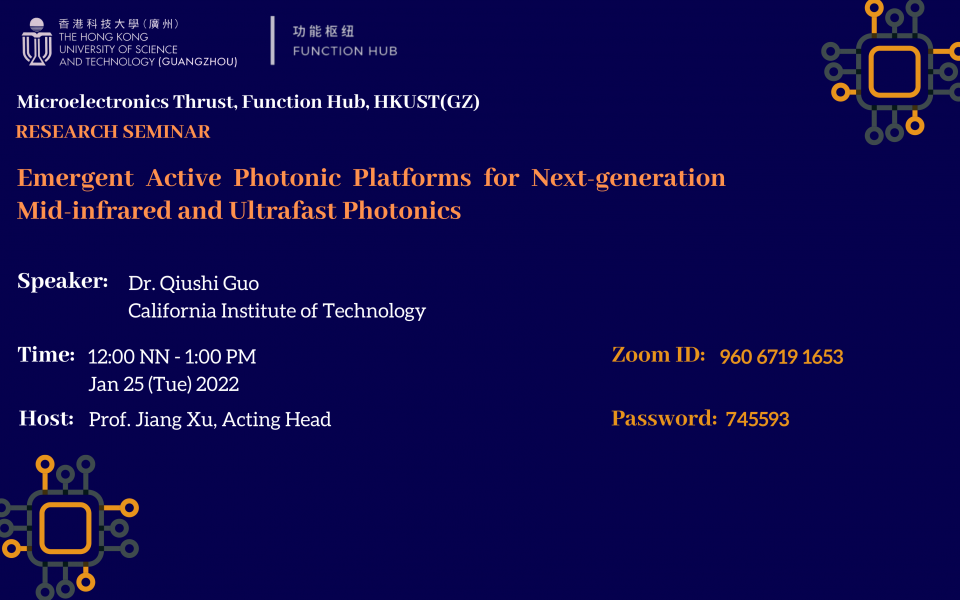Public Research Seminar by Microelectronics Thrust, Function Hub, HKUST (GZ) - Emergent Active Photonic Platforms for Next-generation Mid-infrared and Ultrafast Photonics
Supporting the below United Nations Sustainable Development Goals:支持以下聯合國可持續發展目標:支持以下联合国可持续发展目标:
Dr. Qiushi Guo: As two basic properties of light, wavelength and timescale are central to numerous photonic applications. Compared to visible and near-infrared, the longer wavelength mid-infrared spectral regime contains unique thermal visual information and chemical fingerprints of the environment. On a different front, femtosecond light sources and systems can enable ultrafast information processing, sensing, and computing. Yet, current chip-scale photonic devices and systems are facing tremendous challenges in detecting, generating, and processing light of long wavelength and ultrashort timescale. Overcoming these challenges requires new materials and clever device architectures, and these technologies stand poised to revolutionize fields such as biomedical sensing, free-space communication, and photonic computing in both quantum and classical domains.
In this talk, I will show that by engineering the carrier and nonlinear dynamics in emergent active photonic materials, we can detect photons beyond the regimes accessible to conventional laser sources and detectors, and process information in an ultrafast manner. In the first half of my talk, I will first briefly introduce the discovery of black phosphorus (BP) mid-infrared photonics, highlighting the world’s first BP mid-infrared detectors with high internal gain, as well as BP’s electrically tunable spectral response due to its unique bandgap tunability. Then, I will discuss a new strategy for detecting longer wavelength mid-infrared radiations at 12 µm. This is achieved by harnessing the intrinsic mid-infrared plasmons in large-scale graphene.
The second half of my talk will cover my recent work on integrated lithium niobate (LN) ultrafast photonics in both classical and quantum domains. I will discuss the realization of ultra-strong nonlinear optical interactions and dynamics in dispersion-engineered and quasi-phase-matched integrated LN devices, which have enabled 100 dB/cm optical parametric amplification, widely-tunable optical parametric oscillators, femtosecond and femtojoule all-optical switching, as well ultra-wide bandwidth quantum squeezing. Finally, I will outline promising pathways toward realizing chip-scale ultrafast light sources and microsystems for mid-infrared free-space communication, on-chip spectroscopic sensing, coherent all-optical computing, and next-generation thermal vision technologies.
Dr. Qiushi Guo is currently a postdoctoral scholar at the California Institute of Technology with Prof. Alireza Marandi. He received his Ph.D. in Electrical Engineering from Yale University in Dec. 2019, advised by Prof. Fengnian Xia. He received his M.S. degree in Electrical Engineering from the University of Pennsylvania in 2014, and his B.S. degree in Electrical Engineering from Xi’an Jiaotong University in 2012. Qiushi is the winner of the 2021 Henry Prentiss Becton Graduate Prize for his exceptional research achievements at Yale University. His research interests include integrated nonlinear/quantum photonics, mid-infrared photonics, and 2-D materials optoelectronics. He has published 36 peer-reviewed research papers in leading scientific journals such as Nature Materials, Physical Review Letters, Nature Communications, Science Advances, Advanced Materials, Nano Letters, ACS Nano, and Optica, with citations more than 2600 times. He is serving as a guest editor of the journal Micromachines.
